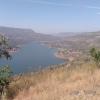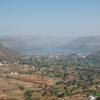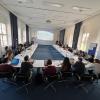
In fairSTREAM, IIASA researchers aim to understand and reconcile issues of fairness. This is a key aspect for managing risks in nexus issues, such as the food-water-biodiversity nexus, where conflicting views on procedural and outcome fairness often remain unresolved and jeopardize finding viable solutions. Addressing these issues is a major challenge that requires the integration of multiple sources of knowledge and the cooperation of many different societal actors.
To support this endeavor IIASA researchers from Equity and Justice (EQU), Water Security (WAT), and Biodiversity, Ecology, and Conservation (BEC) are aligning their expertise in designing transdisciplinary research (TDR) processes with those in quantitative modelling. To this extent, the researchers will first create a methods toolkit for co-production that explicitly considers procedural and distributional justice. Based on this toolkit we will then design and implement a co-production process, which we will support and upscale by quantifying distributional justice in stakeholder visions for future development of the region. We do so by building a large-scale agent-based model, coupled to a hydrological and biodiversity model, that simulates millions of individual farmers.
Research design
The fairSTREAM project is a methodological meta study reviewing, developing, and integrating soft and hard systems methods for knowledge co-production. Thus, creating novel methodologies is one of the main goals of the project. The main research steps are
- systematic review of methods for co-producing knowledge, qualitative systems analysis using both literature and retrospective case studies.
- the development of a co-production toolkit comprising systems methods that capture questions of procedural and outcome fairness.
- Application of the toolkit by organizing a living lab in the Bhima basin to co-create qualitative future narratives.
- The co-production of quantitative future scenarios, followed by modelling exercises in a large-scale coupled ABM, with a particular focus on crop farming and integrating biodiversity considerations.
The fairSTREAM project team
The fairSTREAM project team consists of researchers at SOPPECOM (Society for Promoting Participative Ecosystem Management) and IISER Pune (Indian Institute of Science Education and Research Pune), located in India, and IIASA.
 © IIASA
© IIASA
Materials
here we share emerging materials from the project.
Publications
Hanger-Kopp, S., Kikstra, J. , Mintz-Woo, K. , Scheifinger, K., Schinko, T. , Wallimann-Helmer, I., Wong, C., Woodhouse, E., & Zimm, C. (2024). IIASA/EQU Justice Framework: A descriptive guideline for science and policy. IIASA Working Paper. Laxenburg, Austria: WP-24-012
Martin, J. , Kanade, R., Bhadbhade, N., Joy, K.J., Thomas, B.K., Willaarts, B. , & Hanger-Kopp, S. (2024). Review of the food, water and biodiversity nexus in India. Environmental Science & Policy 159 e103826. 10.1016/j.envsci.2024.103826.
Stefaniak, E., de Bruijn, J. , Smilovic, M. , Artuso, S., Martin, J. , Maxwell, T., Joshi, J., & Hofhansl, F. (2024). Modelling Water and Biodiversity: Coupling a dynamic eco-evolution trait-based vegetation model with a community water model. DOI:10.5194/egusphere-egu24-16184. In: EGU General Assembly 2024, 14-19 April 2024, Vienna.
Zimm, C. , Mintz-Woo, K. , Brutschin, E. , Hanger-Kopp, S., Hoffmann, R., Kikstra, J.S. , Kuhn, M., Min, J. , Muttarak, R. , Pachauri, S. , Patange, O. , Riahi, K. , & Schinko, T. (2024). Justice considerations in climate research. Nature Climate Change 14 22-30. 10.1038/s41558-023-01869-0.
de Bruijn, J. , Smilovic, M. , Burek, P. , Guillaumot, L. , Wada, Y. , & Aerts, J.C.J.H. (2023). GEB v0.1: a large-scale agent-based socio-hydrological model – simulating 10 million individual farming households in a fully distributed hydrological model. Geoscientific Model Development 16 (9) 2437-2454. 10.5194/gmd-16-2437-2023.
Kanade, R., Lohakare, K., Bhadbhade, N., Joy, K.J., Thomas, B.K., Martin, J. , & Willaarts, B. (2023). Situational Analysis of the Upper Bhima sub-basin in the context of the Water-Food-Biodiversity Nexus. Zenodo 10.5281/zenodo.8255959.
Martin, J. , Kanade, R., Bhadbhade, N., de Bruijn, J. , Hanger-Kopp, S., Irshaid, J., Joy, K., Lokahare, K., Thomas, B., & Willaarts, B. (2022). Transdisciplinarity in practice: the food-water-biodiversity nexus and its fairness in the Upper Bhima Basin. In: Systems Analysis for Reducing Footprints and Enhancing Resilience, 16-17 November, 2022, Vienna, Austria.
Johannesson, P., Zhemchugova, H., & Hanger-Kopp, S. (2022). An Ontological Analysis of Justice. In: Proceedings of the 16th International Workshop on Value Modelling and Business Ontologies (VMBO 2022), held in conjunction with the 34th International Conference on Advanced Information Systems Engineering (CAiSE 2022), Leuven, Belgium, 6-10 June 2022.
Events
12 November 2024: Alternative Futures: The Water-Food-Biodiversity Nexus in the Upper Bhima Basin (Final fairSTREAM stakeholders workshop)
15 October 2024: Transdisciplinary Research at IIASA (workshop)
10-14 June 2024: fairSTREAM at the Sustainability Research & Innovation Congress (SRI) in Helsinki, Finland
6 February 2024: Second fairSTREAM stakeholder workshop (Pune, India)
27 November 2023: IIASA Justice Framework Workshop
17 January 2023: First fairSTREAM stakeholder workshop (Pune, India)
5 September 2022: Open-house project meeting
23 November 2021: Kick-off event
News

23 July 2024
Introducing the IIASA Justice Framework

27 February 2024
Second stakeholder workshop of the fairSTREAM project

27 November 2023
EQU Justice Framework Workshop at IIASA
Pagination
- Page 1
- Next page Next ›
Events
Austrian Academy of Sciences-Dr. Ignaz-Seipel-Platz 2, 1010 Vienna
Workshop on Qualitative Systems Mapping (QSM)
Pagination
- Page 1
- Next page ››

